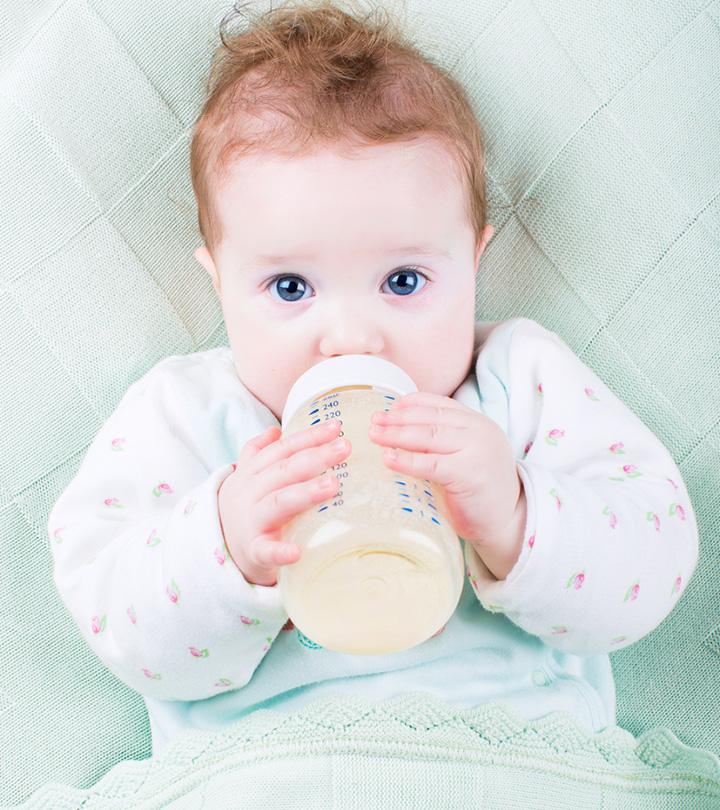Image: Shutterstock
When it comes to drinking cold milk, there may be a few things to take into consideration. First, storing the milk in the refrigerator will keep it fresh, and if your baby prefers cold milk, you may offer it. According to the Center for Disease Control and Prevention, you can offer the milk cold, warm, or room temperature (1). Just ensure it is not too hot for the baby. Most teething babies will find relief when they drink cold milk.
Read this post that answers your concerns related to— can babies have cold milk.
Can Babies Have Cold Milk?
Your baby can feed breast milk at room temperature or slightly colder. It does not necessarily need to be warm (1). However, there is no medical evidence about cold milk consumption and the baby. Hence, you should discuss feeding cold milk to your baby with the baby’s pediatrician and then decide according to the baby’s health status and preference between cold and warm milk.
The milk should not be too hot or too cold for the baby to avoid scalding their mouth in case of hot milk. It is safe to check the temperature of the milk before feeding it to the baby. While it is said that the milk should not be hot, it is okay to feed warm or cold milk. If your baby prefers only warm milk, you can use bottle warmers that work for bottle-feeding or expressed breastmilk (2).
Pros Of Giving Baby Cold Breastmilk Or Formula
Here are some pros of feeding cold breast milk or formula milk to your baby (3):
- Feeding the baby with cold milk is easier as heating the milk at a low temperature takes longer.
- Feeding cold milk helps eliminate the risk of overheating the milk, which is not good for the baby, as it may lead to mouth blisters.
- If the baby is used to drinking cold milk, it makes traveling easier. You can directly give expressed milk or bottle feed and need not worry about warming the milk.
Cons Of Giving Baby Cold Breastmilk Or Formula
Here are some cons of feeding cold milk to your baby (3):
- If breastfed babies drink warm milk regularly, they may refuse to drink milk from cold bottles in emergencies.
- Feeding cold milk to a prematurely born baby may not be a good choice. You should warm up the milk before feeding it to the baby.
- Sometimes it may be difficult to mix a bottle of cold milk properly because the fat begins to separate.
Frequently Answered Questions
1. Can a baby drink cold milk and achieve optimum weight gain?
Milk cannot be the only factor contributing to your baby’s weight gain. Also, there is no evidence saying cold milk can cause weight gain. However, increasing the amount of feed may help a premature infant become healthier as it nourishes the body and increases the fat (4).
2. Can babies drink cold milk when they have a cold?
While there’s no evidence of the side effects of babies drinking cold milk during a cold, you should avoid giving them anything cold if the baby is having a cold or any other health concern as it might irritate the throat.
3. Can babies drink cold milk in the middle of the night?
Anything cold will not hydrate well and may cause digestive problems in the middle of the night, making it difficult to sleep. Therefore, while there’s no specification about not drinking cold milk in the middle of the night, it is sensible to drink warmer milk for better digestion.
4. Can babies drink milk straight from the fridge?
There is no clear evidence why you shouldn’t do it. However, since babies are sensitive and still building their immune system, it is better to feed moderately cool or warm milk or refer to special health advice (3).
5. Can cold milk cause constipation in babies?
There is no evidence that cold milk causes constipation; however, feeding too much milk may be one of the reasons for constipation in babies. Therefore, make sure that the baby is neither underfed nor overfed (5).
While overheating milk is not healthy, warm to cool milk for the baby is preferably the best. You can give the baby cold, warm, or at room temperature milk. Since breast milk is directly expressed from the breast, the milk temperature is usually the same as room temperature, i.e., moderately warm.
References:

